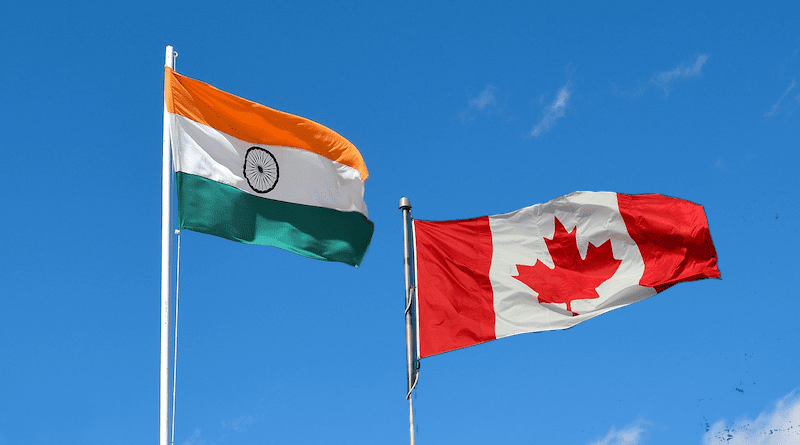Call To Halt Canada-India Friction – OpEd
It is evident that large majority of the people living in India and Canada are highly concerned about the ongoing bitter relations between the two countries and want their traditional good relationships between to be restored as early as possible.
While it serves no purpose at this stage to discuss as to who is responsible for developing such friction between these two democratic countries, many people in India and Canada think that the Prime Minister of Canada Trudeau has acted and spoken carelessly, attributing the death of a Sikh political leader in Canada as due to the machination of the Indian government. He has said this without adequate proof and has even made the statement in Canadian parliament. It is natural that this statement has irked India, as it could spoil the reputation of the country around the world. India has consistently denied this allegation but the seed of friction has been laid by the Canadian Prime Minister.
After this, one event followed the other with Trudeau holding on to his view. In the process, Canadian Prime Minister has done enormous damage to the relation with India and Indian government too has over reacted to the accusation of the Canadian government instead of ignoring it. The deterioration in relationship would not be in the interest of both the countries.
The fact that people in Canada too are unhappy about the state of affairs became evident,when Canada’s opposition leader said that he would work to restore “professional relationship” with India, if his party were to come to office in the next elections in Canada. The question now is how to restore the relations between both the countries to the traditional level.
During the last several decades, Canada has been welcoming the migrant population liberally and have been providing citizenship to migrants from all over the world, probably without adequate check and control from the point of view of national security. In the process, today Canada has mixed population from various countries and such migrants who have become the citizens of Canada belong to different religions including Christians, Muslims, Sikhs, Hindus and Buddhists and so on. Further, it appears that some of these migrant turned citizens have twin loyalty in their mindset to Canada, as well as the country from which they have migrated.
With such an influx of migrants over the years and with almost unchecked level of freedom given to the people in Canada, the migrants have been tempted to organise movements operating on Canada soil to “fight” for a separate state for a particular group in their original country. Immediate example is the LTTE movement freely operating in Canada to split Sri Lanka and Khalistan movement freely operating in Canada to split India.
Justifiably, India and Sri Lanka are unhappy and annoyed that Canadian government is giving freedom for operating separatist movements in Canada and it is keeping its eyes and ears closed to the violent objective of the separatists. Probably, a few other countries are also unhappy with Canada for allowing separatist movements, threatening the territorial integrity of those countries.
In the process of massive migration of people from different countries with varied traditional and cultural standards and value system, the demographic structure of Canada is constantly changing and with such migrant population getting considerable space in the Canadian parliament and government. In the process, the political and electoral power of such migrants have also become strong, influencing the Canadian politics.
Probably, the Prime Minister of Canada feels that allowing the migrant Sikh population supporting Khalistan movement in good humor would help him politically and has made such a statement against India. Many people think that this is a short sighted approach. The religious and twin loyalty of a section of Canadian population has become evident when the recent visit of Trudeau to a mosque in Canada resulted in objections by a section of Muslims living in Canada..
Obviously, the Canadian Prime Minister cannot afford to say a word of good about India, since it amounts to eating his own words. But, there is concern in Canada that it can suffer due to such policies as large number of student population normally going for higher education from India to Canada would start looking elsewhere. There could be so many other loss of business opportunities for Canada just as it would happen to India also.
What should be done now is that the spokespersons from both the countries should remain silent for sometime, so that the dust can settle down and saner voice would be heard from both the countries. The fact is that Canada and India are natural friends and the present friction is an unnatural development.

